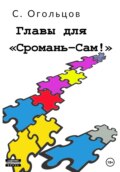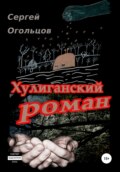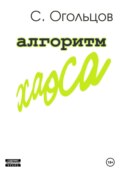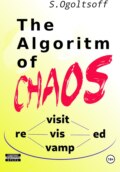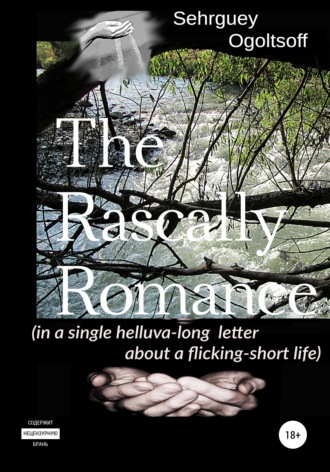
Сергей Николаевич Огольцов
The Rascally Romance (in a single helluva-long letter about a flicking-short life)
We bypassed the huge red-tiled forms of various height; some of them were bridged with indoor galleries or connected with lower structures. Eera was obviously oppressed by that stodgy Bau Stile void of fanciful conceits, quite understandably though, not everyone appreciates that particular variety of architecture and I, personally, would sooner pull for works by Corbusier too.
I escorted silent Eera, looking glum and sullen at the moment, to the required building where we were accepted in a small one-window office by a dark-haired woman in a doctor’s smock named Tamara…er…Tamara…well, I am sorry, her patronymic escaped my mind. At the desk by the window, there sat a man of a well-trained carcass, also in white.
Tamara hospitably invited us to get seated on the soft sofa in a white cloth case alongside the wall and retired to the armchair opposite it. There followed a conversation of nothing in particular, but when she asked me about my preferences in music, the man by the window started to prompt, "Variety, of course!" which convinced me that his presence was not for just to ensure Tamara's security, if I were a violently deviated case. So I had to honestly admit having more than one preference: Ella Fitzgerald and Johann Sebastian Bach, because I do not drive a fool about the things that really matter.
Tamara told Eera that deviations of my kind were not of dangerous nature, however, if so was Eera's wish and if I did not mind, they could keep me for more close observation.
I did not mind, only warned that on Saturday it was my brother's wedding to which Eera and I had been invited and, if Tamara considered it acceptable, I would come back to the 4th kilometer on Monday. Upon my word of honor.
Tamara most kindly concurred and saw us out into the corridor. From behind the glazed door in its end, there came a muffled noise of a multitudinous assemblage…
~ ~ ~
By that time my brother Sasha had already moved from PMS to KhAZ and was working on some sophisticated milling-grinding machine… The KhAZ was not the KhAZ itself, but only a branch of the Kharkov Aviation Plant. They did not assemble any planes at the branch, but produced spare parts of most different configurations, packed them in boxes, and sent to KhAZ or to its other branches in some other cities. In Konotop, the KhAZ branch was named, for shortness, just KhAZ and everyone was eager to get a job there because of high wages. Sasha earned 200 rubles a month! The rest of the workers got a lower payment because there was just one machine tool of so superb high-precision. Another advantage of KhAZ was its location in the Settlement, you could come home for the midday break and have your havvage.
Unfortunately, there was a drawback too, KhAZ made you work longer than just 8 hours a day. No, there were no labor legislation violations. Sasha was leaving his workplace at 5 sharp, but his work overtook him when even at home. He complained to me that even watching football on TV, he contemplated his working plans for the following day: which spare parts to work on in the morning, and which after the midday break. I felt sorry for my brother, but didn't know how to help him out…
In the Settlement, earning 200 rubles a month, you could start up a family of your own without hesitation. Sasha's chosen one, Lyouda, worked at "The Optics" store in Zelenchuk Area and she also was from the Settlement. Besides, she was a really enviable bride having two khuttas or, rather, each of her estranged, though not divorced, parents had a separate one, which guaranteed the young family immediate solution to the problem of housing, one way or the other. Who would decline living in clover? Thus, my brother became an Adoptee.
Eera was going to buy bed linen as the wedding present, but all the traces of such goods since long had disappeared from the stores. The explanation of the fact provided by the planned economy we lived under deducted that particular shortage from the World Olympics which Moscow was to host the following year, and the mentioned commodity would be needed for doing beds in the Olympic Village.
(…in a flash-forward, I can assure that two years later bedding remained a sharp deficit. I just cannot imagine what those guest sportspersons were doing to it in the Olympic Village…)
So, for the wedding present Eera bought a nice jug of red transparent glass, wisely reasoning that the bedsheets would wear out very quickly but the jug—if not broken—could stand in the hutch until the golden anniversary…
Since the wedding happened to coincide with our mother's birthday, I wanted to present her flowers. Gaina Mikhailovna insisted that no flowers could be bought on November 24, yet I went to the bazaar all the same.
On the bridge over the Oster, I saw a man holding a bouquet in his hands, in a company of two ladies. They were just standing there, looking anything but traders. However, I felt their presence on the bridge was no accident, came up, and asked if he would sell me the flowers… My mother-in-law's bewilderment had no limits, but I knew that somewhere around Odessa or in the worlds parallel to it, I had done something right, which was not forgotten by the unknown yet grateful allies…
We went to Konotop by 15.15 local train. The wedding party took place in a three-room khutta on Sosnowska Street in the Settlement. The flowers caused surprise even there. The surprise grew exponentially, when I presented them not to the bride. Then Sasha remembered what day it was, and assured the guests it was okay.
The following was a traditional Settlement wedding of an Adoptee. The only difference that at the party I gave up smoking. It happened when my neighbor at the table started to convince me of the impossibility of kicking off the habit, especially at a party of any kind. I put out the lit cigarette and that was all there to it.
(…I am a non-smoker even now. That was my way of kicking it…)
The next morning at Decemberists 13, Eera announced my intended trip to the 4th kilometer by Chernigov. There followed a stormy exchange of views with my parents. They opposed the very idea of the trip and demanded it's cancellation. No matter how hard I tried, they could not understand that I had promised to be there on Monday. How to survive in a world where you could not rely even on your own word?
Eventually, Eera took sides with my parents, and they continued trying to prevail upon me in concerted efforts. Only Lenochka was sitting silent aside in the far end of the folding coach-bed.
"So what? Gave him education for your own misery?" my father reproached my mother. Then he turned to me, "We've done all that we could for you. Now it's your turn. Do as we ask. Or we're not the stuff? What are our wrongs? Tell it!"
"Okay, I’ll tell!" responded I, and slammed my fist at the table top, "Why did you stop writing poetry?"
There happened a sharp change in my father's demeanor. In obvious embarrassment, he was turning his eyes away from both his wife and daughter-in-law. Even in the deep wrinkles over his forehead, there appeared never observed marks of shyness, "Well… I was young… it was the war then…"
(…that's life, huh? You start to drive a fool and unexpectedly run into a frank confession…
By now he gave up the poetry for good and switched over to oratory. In long winter evenings, he puts his felt high boots on and goes out to the meeting of neighbors of his age, under the lamp on the post by the Kolesnikov's khutta. And there they stand on the trampled snow, discussing the news from yesterday's news program "Time", hotly debating whether Muammar Gaddafi's a manly man or the same clown as Yasser Arafat…)
In the way of a compromise, they decided that before leaving for Chernigov, I would go with my mother to local psychiatrist Tarasenko from whom (here my father narrowed his eyes threateningly) no one had ever a chance of getting off-hook. Then I escorted Eera to the station, and all the way there she tried to persuade me not to go to the 4th kilometer. However, my word to Tamara was out and past recalling…
In the large light building of the Konotop Medical Center, not far from the Avangard Stadium in the Central Park of Recreation, people were crowding next to each and every door, and only the door to the office of psychiatrist Tarasenko stood out by its forlorn solitude. When my mother and I entered his office, Tarasenko explained the phenomenon by the insufficient awareness of the population, while there, overseas, every fourth citizen kept visiting a psychiatrist.
Tarasenko's office was equipped with his assistant nurse and the standard medical office furniture. However, the furniture was arranged very strangely. The oddity was created by the positioning of the desk. Besides being put in the center of the room, it was also turned the wrong way, with its drawers to the door.
I was asked to get seated at the desk. My mother sat on a chair by the wall, and the present medical team of two stood on either side of me. I did not like this whole disposition intended to inflate my megalomania—you sit there like Chairman Mao, and those in white are standing around as an errand-boy with an errand-girl. So, I pushed the chair a tad bit back from the desk, turned it 90 degrees and, stretching my legs out, put one foot on the other in the attitude of a kicking back cowboy.
And now Tarasenko and his partner rushed to pull abruptly and slam back the desk drawers, with bang and crash… Getting midst so violent a company, I, naturally, pulled my legs back but kept sitting, yet with my ears pricked up: what the heck?
On making sure that I hadn't jumped out of the door, neither tried to flee climbing up the window blinds, Tarasenko stopped the test and announced that I was as healthy as a bull.
"Tell it to him!" exclaimed my mother, sobbing, "He wants to go to the psychiatric hospital in Chernigov!"
"What for?"
"His wife has sent him there!"
"Is she a doctor?"
"No!"
"Why then? People can send you anywhere. Is he her slave, or what?"
"Yes! Yes! He's a slave!"
(…look here, Joseph Yakovlevich, aka the Beautiful, you were sold into slavery by your brothers and that hurt, right?
How would you feel being sold by your own mother?..)
Tarasenko once again forbade me, already as to a slave, to go anywhere, and I together with my mother left his office.
On the way to the streetcar stop, my mother asked, "Now, you see? Got convinced?"
"It does not change anything."
"If they do something to you, I'll kill her!" said my mother with a suppressed sob.
"Mom," said I, "what kind of a book have you read recently?"
Of course, I knew perfectly well that since long my mother had forsaken reading books, yet you're still supposed to forward one or another clue to politely maintain a conversation, you know…
Because of the check to examine my head before submitting me into slavery, and further inconsistencies in the train traffic timetables, I reached the 4th kilometer by Chernigov late at night. However, the stipulated Monday was not over yet and I started to knock at the iron gate, giving rise to discontent yells from the securities in the check-entrance house. They switched on the light and asked what it was I was at, the name of Tamara became the password. Two more orderlies in blue flannel gowns came up and took me to the waiting room.
There I submitted my clothes and received in exchange pajamas, as well as a pair of army kirza high boots. The left boot was my size, but the right one squeezed the foot inhumanely. Probably, that was retaliation for disturbing them at so late an hour.
Then thru the cold darkness, I was taken to the fifth unit and handed over to the paramedic on duty. He led me into a wide empty corridor-hall lit dimly, because of the late hour, with a pair of shaded lamps in the wall, reflected by the dark glass of a distant window in the opposite end of the corridor. Glazed doors to the wardrooms were lined along the hall’s left wall. The paramedic escorted me into one of the wardrooms, pointed at a free bed, and went out…
In the obscure light seeping in thru the glass in the door, I could make out half-dozen beds laid with wrapped up figures, and ghostly whitish nightstands in between. I undressed and lay down, suppressing involuntary fear…
Apparently, so late addition made the population of the ward to keep low under their blankets, but gradually they thawed out. Someone invisible asked me from out of the corner if it was me. They hush-hashed at him and he fell silent… I refrained from giving any answer. Thru the glazed door, there came a faraway cry from down the corridor and cut off too… I lay—a wrapped up figure as everyone else—rejoicing that I still managed to do it on Monday, and felt the upsurging alertness because I understood who I was among.
"So what, Kostya, would you like some home-made sausage now?" asked one of the invisible figures of his invisible gossip.
I was tickled with irresistible laughter; how quickly they managed to figure me out!. When Eera and I were leaving Chernigov after our joint visit to the 4th kilometer, Eera bought a coil of home-made sausage at the station. It was really delicious.
Now, the brainstorming team in the darkness entered an expert discussion of that very sausage, and I, amused by their getting on track so casually, tried to choke the laughter and snuffle it away thru the nostrils, biting the corner of my pillowcase, so that they would not take me for a psycho. At some point, I could not keep it down anymore, and they broke off in a freaked out silence…
~ ~ ~
The morning started with the scuffing of mules in the corridor-hall. In a yoke of a waffle tower around my neck, I went out in the heavy kirza high boots and, following the mainstream of the traffic, found the washroom and toilet. Then there was a usual havvage for breakfast.
When doctors arrived from the city, Tamara looked into the huge corridor and called me, by my last name. I approached her with the apologies for being late on Monday; she generously pardoned me and retired back to her parts.
The corridor-hall society was populous, diversified and in a state of noisy Brownian movement. Absolutely unsystematic… Apart from me, only one individual, with his hair closely cropped in zek style, wore high boots. He, for the most part, lay on the floor tiles by the white radiators of central heating installed under the windowsill in the far end of the corridor. Time and again, he was pressing himself against the other patient's backside, who also was lying there. The courting wooer’s advances received a sluggish resistance expressed in reluctant squirms and languid counter pushes.
The mobile part of the crowd roamed around wearing mules, immersed in their individual inner worlds from which they occasionally emerged to issue some incomprehensible exclamations.
A cripple on a low trolley navigated the stream of their wandering legs, propelling himself with hand pushes against the floor tiles. He obviously supervised some part of the society capable of understanding instructions and orders and served the non-static hub for their hangout in the style of a loose black market…
A pair of Messrs. Pretty-Guys kept together. The dark-haired one was selling himself for the master-thief in their milieu of 2.
A young man of Central Asian appearance invited me to play checkers at a table in the far corner. Every eye in his face moved independently from its counterpart as happens when the brain hemispheres do not interfere with the sovereign internal affairs of their neighbor and each one controls their own eye. The guy obviously could not play checkers, and when there remained just one piece of his on the board, I announced the draw and did not play anymore… And I also declined playing cards with the Messrs. Pretty-Guys.
On the other end of the corridor by the window, between the locked door to the courtyard and the glazed door to the passage with medical offices, a white figure of a nurse sat in a chair. She never intervened in anything. She rose from her throne only after the midday havvage to stately walk along with the gurney, arriving from the medical staff passage, to the center of the corridor-hall.
"Medications!" sounded joyful yells from different parts of the crowd. They rushed to scramble around the movable table, grabbing up their favorites from the pills of different color and size, scattered over the oil-clothed top. Soon after, some glassy-eyed appeared in the crowd. The exchange transactions at the black market grew more animated…
To pass the time, I followed the example of Lenin and Dean Reed, measuring their cells with steps from end to end. Luckily, I had much more space and orbited the huge corridor in a sweeping ellipse, from the window in one end to the window by the locked door in the other. Being not the only moving body in that space, I carefully avoided collisions, especially since I paced at a rapid rate.
Some in the crowd paid attention. The blonde one from Messrs. Pretty-Guys started up the Indian drums beat against the cover of a thick book, which he constantly kept in his armpit, accentuating the footfalls of my high boots.
"Why are you driving a fool? You need it?" shouted the dark-haired one in my wake.
"Try it yourself, you'll get high!" yelled I back, scudding off to the next apex in the ellipse.
Then one activist in the Brownian movement by the walls suddenly got it. He issued a happy scream and also started running regular ellipses of an orbit, though not along, but across the hall-corridor.
"Ogoltsoff infected Baranov!" squeaked some rat from the crowd to the queen in her chair. But she did not intervene in anything.
Walking was painful, because the right boot, invented for the torture kit of the Inquisition under the name of "Spanish boot", was two sizes smaller than mine. I managed to withstand just one day, and on the following afternoon, I decided that was enough for playing Andersen's Mermaid and turned to the nurse with the complaint. She gave me a pair of regular mules, like on the rest of inmates, only much more rundown, so my orbiting became painless, yet markedly slowed down…
One compromise because of weakness invites another to slip in and before long your adamant determination tumbles in a crumbled heap. I mean, you start to fix one unbearable sore and there crop up a pack of others crying for amelioration… The button in the pajama pants belt kept slipping out of its too wide loop. I grew tired of living with my hand in a constant clutch at the pants top to prevent their falling down. And again, I had to bring the nurse out of her non-involvement lethargy, with the request for a needle and thread.
No sooner had the repair been over than another nurse appeared from the medical staff passage, and called the roll of those starting to Club. My name was there too…
For a considerable stretch, our caravan of 12 in pajamas followed the nurse in white, yet the concluding inmate in our single file wore also a black padded jacket of a workman. On climbing a stair flight, we entered the long indoor gallery bridging to another building. Outside the windows, there unfolded a withered fields with distant black-and-yellow arrow-shields indicating the direction towards the out-of-sight airfield. Each windowsill in the gallery was packed with multiple pots of cacti accompanied by the handwritten instruction for those meek of heart and ignorant of agriculture, "Do not water!"
Inside, Club presented the replica of a regular club with the stage in front of the plywood rows of seats, and the visual-agitation posters on the walls:
Bread is the head of anything else!
The economy should be economical!
If there is bread, there will be a song!
interspersed by the sheets of wordier pieces in a smaller typeset.
The workman from the end of our file pulled up at the sheet nearest to the entrance to unswervingly study it, at times scratching the cap on his head, for which purpose he had to unlock his hands from being clasped in zek attitude on his back.
I sat down in the last row of seats. The lamps above the stage lit up, and a man in a doctor’s smock came out upon it bearing a displeased countenance along with an accordion.
Two more nurses brought in another caravan – a dozen of women in gray gowns over the sturdy linen of hospital underwear. 2 or 3 of them proceeded to seats in the middle of the hall and were immediately joined by Messrs. Pretty-Guys.
The accordionist started to play for the dancers in the passage between the stage and the front row of seats… A woman of about 40 swiftly paced along the central aisle carrying her sweet smile to the last row and invited me for the white dance.
"Sorry, I'm no good at the waltz."
She went away with her face dropped down. A loss. A loss…
Despite the purpose of the Strauss' "The Danube Waves" no one was waltzing but just hugging each other in pairs, a couple of which climbed onto the stage. In one of those elevated pairs, there was the young man with asynchronous eyes. But now both of them were fixed on the tall soft fluff of gray mohair in the knitted hat of his partner – a nurse in a white smock. Who of them invited who?.
The ladies were first to be taken away before our caravan started off. The workman broke away from the same citation poster on the wall and took his concluding place in the file, without ever unclipping his eternal zek-styled hand-clasp…
~ ~ ~
Apart from orbiting the corridor and visiting the ball in Club, I also was reading. I asked the blonde one from Messrs. Pretty-Guys to lend me the book from his armpit, which he at times used as a drum, and he willingly concurred. It turned out to be a book of stories by Tamaz Chiladze translated from Georgian. I liked them though in original they, probably, were better.
On the third day, I was sitting by the window next to the locked door to the yard, where the first snow was descending in slow quiet flakes. I watched it while reading The Judge and Executioner by Durrenmatt, which I had read years before. Behind me, all the modern world was romping and fussing and rumbling and mumbling and stumbling as reflected in the cross-section by the fifth unit at the fourth kilometer. I was already fed up with it.
Yet, I did not have time to finish reading Durrenmatt read years ago because of the knock on the window pane from outside. On the fluffy thin cover of snow, there stood Eera smiling at me. Silent soft snowflakes swirled slowly about her face. So beautiful…
The nurse brought my clothes and I entered the wardroom to change. Then I returned to the corridor-hall, whose society's particles that retained any close connection with now and here were astounded by my leaving them so soon. Someone, hiding his identity behind the Brownian movement, shouted angrily that it's not right to let me loose, but it certainly was not Baranov because he's a cheerful bozo.
Excited by the freedom at hand, I took a step forward, raised my hand with the fist balled oratorically and shouted out that I was grateful to everyone for everything and promised to remember. In response, a spontaneous rally broke out, but I already stepped out in the medical staff passage. On the way to Tamara's office, in one of the rooms, I caught a glimpse of a lonely old lady in a dressing gown and a head kerchief. Crawling on all fours over the floor, she was lining large blocks, the size of a brick, in two sketchy rows.
Tamara told Eera that my treatment had not started yet but since she was insisting so much then let her take me and not be too worried, the deviations of the sort I had demonstrated so far were a commonplace anomaly among the folks with a PhD degree. That was her way of consoling Eera.
(…that snare did not work on me though, by that time I had already found an effective trick for keeping any conceit vagaries in check with an iron grip on my supremacy’s throat, but Eera seemed to have believed the specialist. In any case, two years later she gave me for the birthday present a book by Plekhanov, that very SOB who brought Marxism to Russia.
On the back of its hardcover, she wished me to become as clever as him because she was waiting for that. So, she waited, at least, two years more, though Freud was talking of just one and a half, at most…)
Addressing me, Tamara prescribed a special means of turning back to myself for which end I had every night to watch the news program "Time".
In the following several years, I dutifully followed her prescription and could already with an accuracy of 3 days predict a plane crash or the arrival of the delegation of the Communist Party of Paraguay in Moscow on a brief working visit. But then I got tired of it and dropped watching TV, justifying myself by the proverb that the humpback would be straightened with only his grave, at which point I also, at last, become like everyone else – clean of my leopard spots.
(…O, how pleasantly beautiful this world is if you consider it without digging deeper thru its glossy surface!
“…the symposium was held under the aegis of UNESCO…”
What magic, lovely, charming ring resounds in each word of this splendid line!.
But when you get to coarse plain roots where “aegis” means nothing but a goatskin, and "symposium" corresponds to a collective drinking bout, then you cannot but feel bored with the world where nothing ever changes and once again, as always, there is a jag debauchery under the goatskins of prostitute Unesca…)
"See how perfect this world is,
Have a look!
Ah, how pe-e-e-rfect this world i-i-is!.."
~~~~~



